 Raise your hand if this has ever happened to you – you head to the market and are completely won over by all the gorgeous, seasonal produce. Pretty soon your cart is brimming with yummy fruits and veggies. You get home, stash everything in the fridge and then forget about half of what you bought. Before long most of it isn’t fit for human consumption, and your garbage or compost pile is full of wasted produce. Anyone? Yeah, me too.
Raise your hand if this has ever happened to you – you head to the market and are completely won over by all the gorgeous, seasonal produce. Pretty soon your cart is brimming with yummy fruits and veggies. You get home, stash everything in the fridge and then forget about half of what you bought. Before long most of it isn’t fit for human consumption, and your garbage or compost pile is full of wasted produce. Anyone? Yeah, me too.
How to Store Produce to Last Longer
If you’re getting excited about seasonal foods, it’s great time to think about how to store produce. Let’s make it last as long as possible so we can enjoy every bite! Here are some tips on properly storing all types of fruits and vegetables.
General guidelines
Remove all produce from the packaging. Trim off the rubber bands, remove any plastic packaging and store your produce loose. Not letting produce breathe essentially traps ethylene and speeds up the ripening process.
Don’t store fruits and veggies together. The ethylene fruit gives off can also affect your vegetables, causing them to go bad quickly as well. Bananas are especially notorious for causing other produce to ripen, so keep them away from ethylene-sensitive veggies like tomatoes, asparagus, broccoli, carrots, lettuce and green beans.
Choose glass containers. Plastic containers often have BPA in them, which can leach into your food. To keep plastic chemicals out of my produce, I rely on glass containers for storage purposes. They take up more space in the fridge but they’re still your best bet when it comes to reusable, eco-friendly options.
What to put in the fridge
 1. Berries
1. Berries
Berries of all kinds require refrigeration. They are more apt to spoilage than other fruits. Be sure to sort through and remove any that are smashed or bruised because when one goes bad, the others will shortly follow. You can soak them in a bowl of cool water mixed with a little white vinegar to help halt any mold. Just be sure to let them air dry completely before storing them. Berries don’t like to be wet, so don’t wash them until you’re ready to eat. Instead, store them in a shallow glass container in the refrigerator.
2. Apples
Place in a cardboard box or glass container and refrigerate.
3. Cherries
You can store cherries in an airtight container on the counter for a few days, but they will last longer in the fridge. Keep them out of direct sunlight, remove any bad cherries from the bunch, and avoid washing until ready to eat.
4. Grapes
Store in the fridge, but only wash when ready to use to prevent mold and mushiness.
 5. Vegetables
5. Vegetables
Green beans, peas, zucchini, yellow summer squash, eggplant, broccoli, cauliflower, mushrooms, corn, cucumbers, celery, bell peppers and root vegetables (not potatoes) should be kept chilled.
 6. Leafy greens
6. Leafy greens
Leafy greens can be stored several ways, but there are some shortcuts that will help you eat and not waste them. Some advice says to store them on the stems unwashed. I do that sometimes if I know I want to use the stem too. Other times, I remove the leafy part, wash well, dry in a salad spinner, and store in a container with a paper towel to absorb moisture. If you buy big tubs of salad greens, stick a paper towel inside to absorb moisture and help them last longer. If you go crazy and buy way too many greens (it happens) you can wash them, spin or pat dry and pack into a freezer proof container or bag to use in smoothies or soups.
 7. Root vegetables
7. Root vegetables
Root vegetables will keep for a really long time when stored properly. I keep mine in the vegetable drawer of my fridge, as I do with most of my produce. If you buy root veggies with their green tops still attached, cut them off and treat the greens as described in #3. The greens will keep for 3-5 days, maybe longer depending on how fresh they were when you bought them. The roots will keep for weeks, if not months, if keep relatively dry and cold. If you have a basement that is really cool, dark and dry, they will keep there too. I keep beets and carrots in plastic perforated bags.
 8. A Trick for Asparagus + Herbs
8. A Trick for Asparagus + Herbs
Most herbs need to be kept in the fridge. Leafy herbs like cilantro and parsley (not basil – we’ll get to that) can be kept in a glass of water, lightly covered. Asparagus likes to be stored the same way. It will last a lot longer kept in a glass of water. Trim the ends and place the whole bunch in a few inches of water. If you don’t have the space or don’t want to do that, trim the ends and wrap in a damp paper towel.
More fridge food tips
- Use the veggie and fruit drawers. They are designed to keep the proper temperature and humidity levels for optimum storage.
- Don’t pack your fridge too tight with too many items – the air needs to circulate to keep it cold.
- Check to see that things aren’t spoiling. If you see something on the verge, use it, or remove it to keep the rest of the items from spoiling.
What to keep on the countertop
 9. Tomatoes
9. Tomatoes
You probably know that tomatoes should never go in the fridge unless they are cut. Why? The cold temps affect the texture of the tomatoes and turn them mealy. Let them sit at room temperature and you’re good.
10. Basil
Basil doesn’t keep for long after it’s been cut. It should be stored on the counter in a temperate area (not too cold or hot), in a glass of water. Refrigeration turns the leaves black, as does excess moisture. To keep it longer, puree in a blender or food processor with a little olive oil or water and freeze in an ice cube tray. You can also turn it into pesto, which keeps for longer.
 11. Citrus
11. Citrus
Citrus, as I have heard for years now, is best kept on the counter. However I just read a compelling article on The Kitchn where they tried out the Cooks’ Illustrated test of putting lemons in a sealed plastic bag with the air removed. They kept for a month vs. one week. So that one is up to you. I use citrus fast enough that I keep it on the counter and I feel like it’s easier to juice them when they are at room temp.
 12. Sweet potatoes
12. Sweet potatoes
Sweet potatoes and other varieties should never go in the fridge. Their starches convert into sugar and while you may not think that sounds like such a bad thing, I don’t want my mashed potatoes (unless they are orange) to taste sweet. There is also evidence that storing potatoes in the fridge can also cause carcinogens to form.
 13. Onions + garlic
13. Onions + garlic
Onions and garlic should also be stored somewhere cool and dark, not in the fridge. Also, store onions away from potatoes. If there’s a dark corner on your kitchen counter, cool. If not, stick them in the pantry or basement. The same goes for winter squash.
What to ripen on the counter + then refrigerate
 14. Tropical fruits
14. Tropical fruits
Bananas – To extend freshness, separate bananas from the stem so they’re no longer a bunch. Then store on the counter away from other produce until ripe. Once spots start to appear you can place bananas in the refrigerator to slow the ripening process. Although the peel will turn brown, the fruit inside is still perfectly fine to eat.
Melons – Let ripen at room temperature for 7-10 days. After that, sliced melon can be stored in the fridge for several days.
Peaches and other stone fruits like apricots, plums and nectarines – Leave on the counter for several days to ripen. Then transfer to the refrigerator until you’re ready to eat them.
Pears – If unripe, pears will slowly ripen on the counter for several weeks. If already ripe, store them in the refrigerator to slow the ripening process.
Pineapples – Let ripen for several days on the counter, then slice and put in an airtight container in the fridge.
Good Rule of Thumb
It might go without saying, but it’s a good reminder anyway – if you’ve cut into a fruit or vegetable, store it in the fridge.
Have you learned any tricks about storing produce? Is there anything I forgot to mention?
 1. Berries
1. Berries
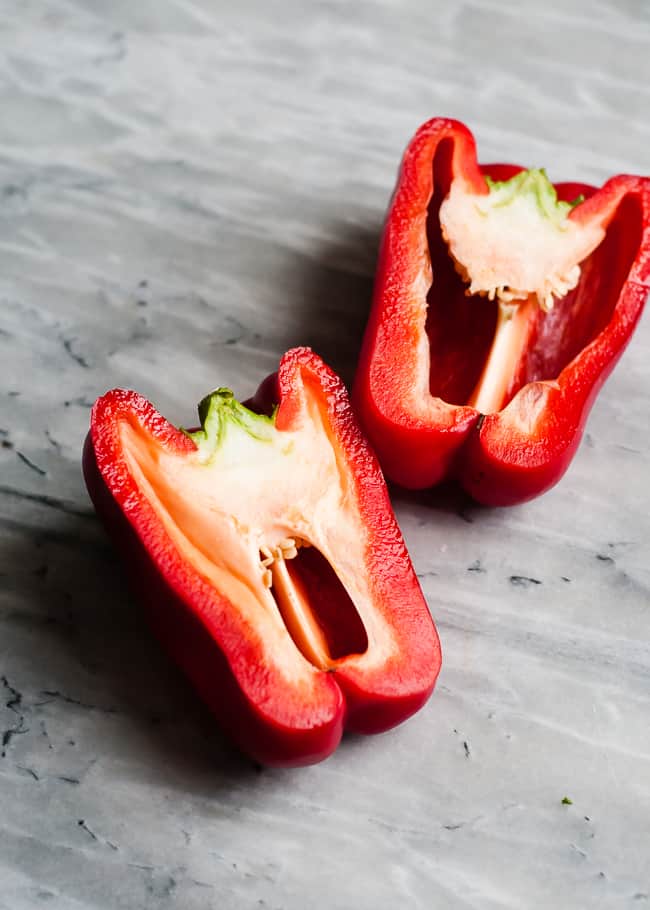 5. Vegetables
5. Vegetables 6. Leafy greens
6. Leafy greens 7. Root vegetables
7. Root vegetables 8. A Trick for Asparagus + Herbs
8. A Trick for Asparagus + Herbs 9. Tomatoes
9. Tomatoes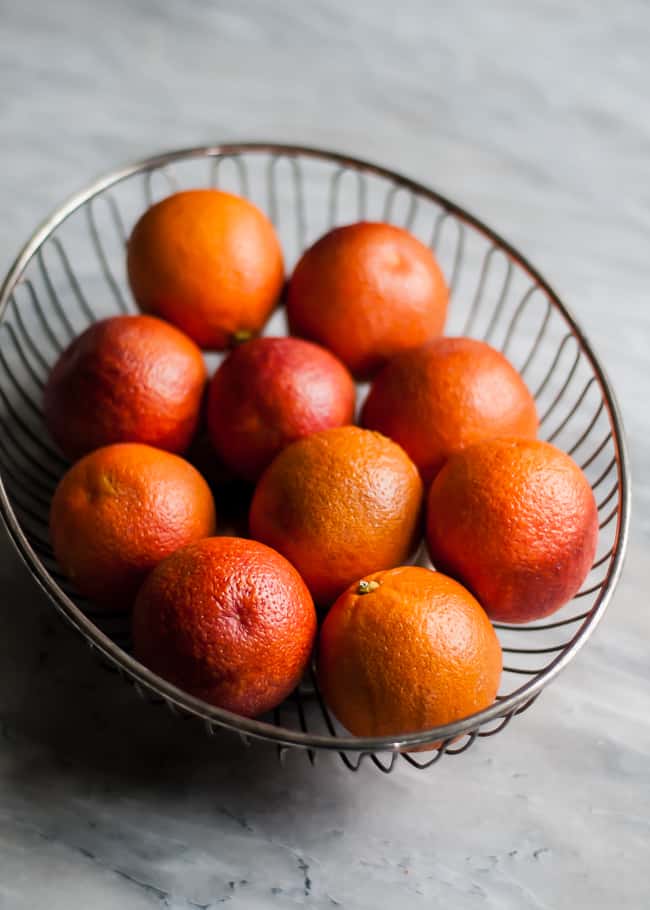 11. Citrus
11. Citrus 12. Sweet potatoes
12. Sweet potatoes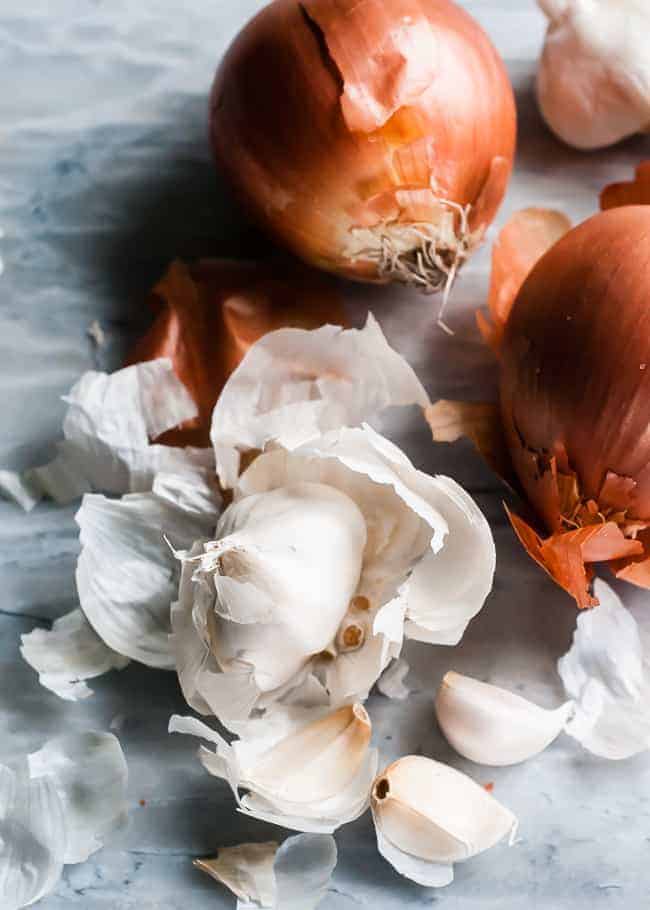 13. Onions + garlic
13. Onions + garlic 14. Tropical fruits
14. Tropical fruits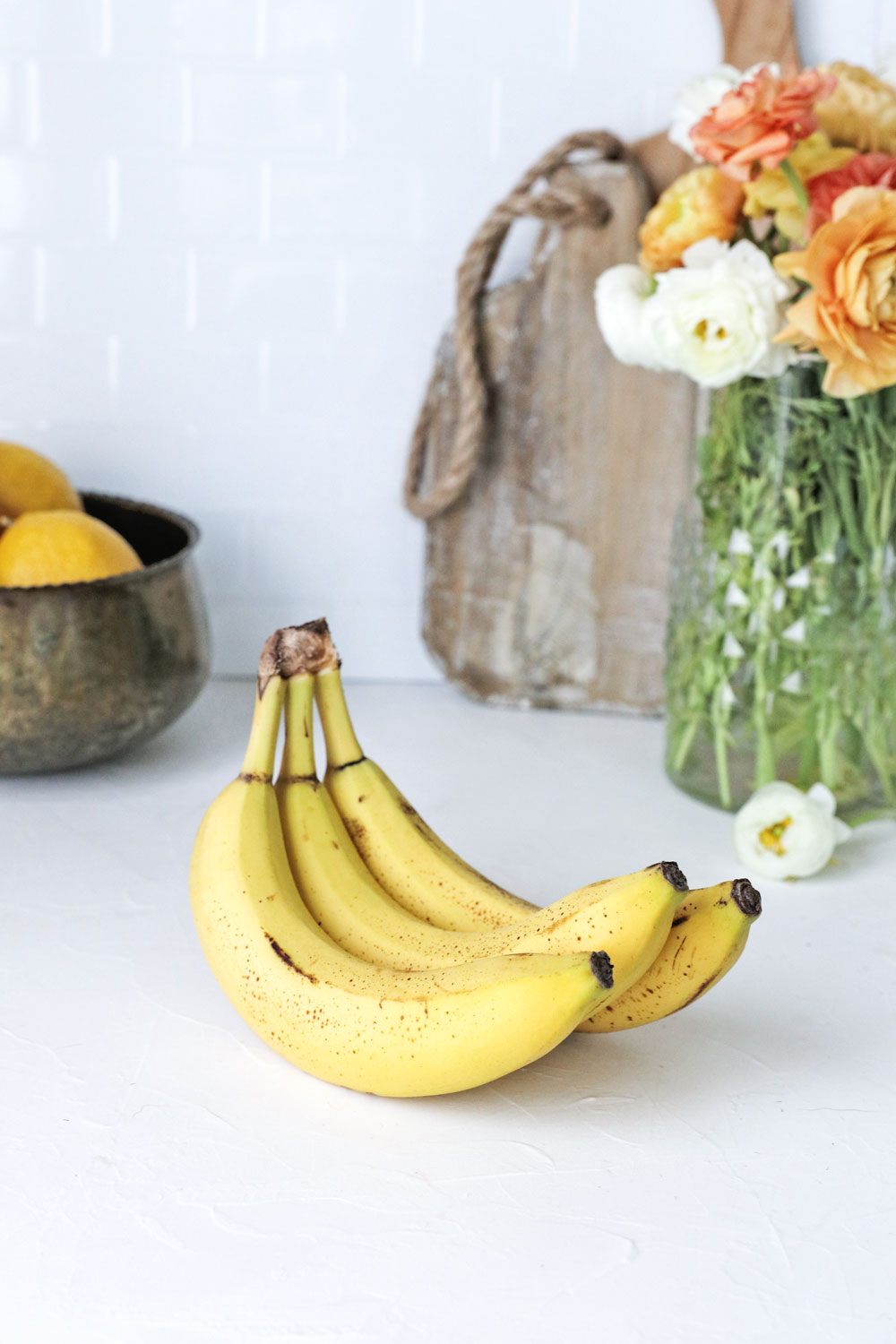
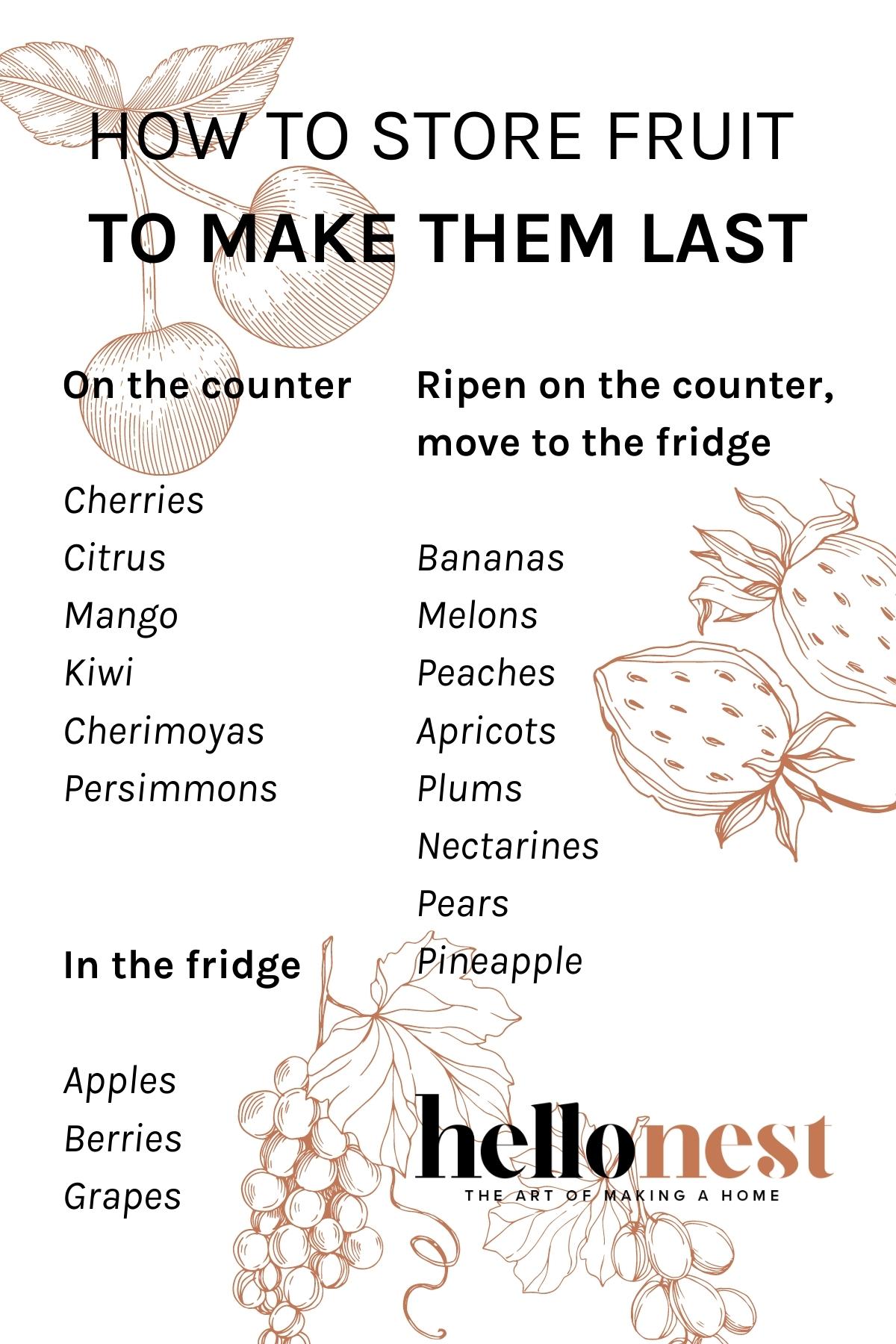
red ball 4 says
I am not very good at writing, after I saw this very good website
bloxorz says
Interesting, very wonderful
Niken says
I always has problems keeping the vegetables last. Thanks for the tricks!
skype.com login says
Onions + garlic -> Just leave it in a dry place
outlook.com says
I never leave potatoes in the fridge
Mirna says
I keep bananas at room temperature, and cover the top (where they’re joined together) with aluminium foil. Don’t know why, but they last longer! Otherwise they turn brown pretty quickly, especially in the summer time…
margo says
Thank you for the helpful list…….one thing I would add is keep apples in the fridge unless it is really cool in the kitchen, no one likes an apple that isn’t crisp and juicy.
Teresa says
In the end, I do what I want based on how I like things to taste. I refrigerate my bananas because I really enjoy eating cold bananas and it keeps fruit flies out of my kitchen. The peel turns brown, but it stays firm inside. The banana just looks less appealing. I also refrigerate nearly everything if it’s over 80 degrees since I don’t use a/c and it will ripen too quickly or rot on my counter (if it’s 90+ outside, my potatoes will go bad in less than a week, so I just buy smaller quantities and refrigerate for a few days). And in the winter, I am much more likely to leave things on the counter to ripen.
Lindsey Johnson says
Great ideas, Lori!
Angela Taormina says
LOVE your blog. Amazing content and incredible imagery. I look forward to it very much. Thank you!
Lindsey Johnson says
Thank you, Angela!